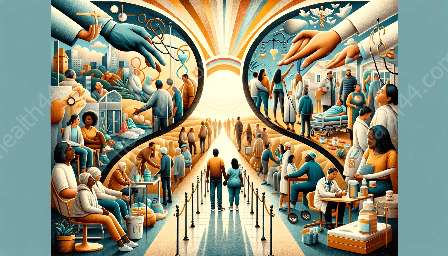As people age, their health and wellness needs change. Understanding the impact of aging on geriatric health is crucial for providing effective care and support to older adults. From physical and cognitive changes to managing chronic conditions, aging presents unique challenges and opportunities for promoting overall well-being.
The Impact of Aging on Geriatric Health
Age-related changes affect nearly every aspect of an individual's life, including their physical, mental, and emotional well-being. Understanding these changes and their impact on geriatric health is essential for healthcare providers, caregivers, and older adults themselves. Here are some key considerations:
- Physical Changes: As people age, they experience a gradual decline in muscle mass, bone density, and organ function. This can lead to an increased risk of falls, fractures, and chronic health conditions such as osteoporosis and arthritis.
- Cognitive Changes: Aging can also bring changes in cognitive abilities, including memory loss, decreased processing speed, and reduced attention span. Conditions such as dementia and Alzheimer's disease become more prevalent as individuals grow older.
- Emotional Well-being: Older adults may face various emotional challenges, including loneliness, depression, and anxiety. Social isolation and significant life changes, such as the loss of a spouse or close friends, can contribute to these issues.
Factors Affecting Geriatric Health
Several factors influence the health and well-being of older adults. These include lifestyle choices, access to healthcare, social support, and environmental factors. Understanding these influences can help in creating tailored approaches to promoting geriatric health:
- Lifestyle Choices: Nutrition, physical activity, and sleep habits play a vital role in maintaining good health as people age. Encouraging healthy lifestyle choices can mitigate the impact of age-related changes and reduce the risk of chronic diseases.
- Access to Healthcare: Regular medical check-ups, access to specialized care, and medication adherence are crucial for managing age-related conditions and promoting overall well-being. Ensuring older adults have access to healthcare services is essential for maintaining their health.
- Social Support: Maintaining social connections and strong support networks can positively impact geriatric health. Engaging in social activities, participating in community events, and staying connected with family and friends can contribute to a sense of belonging and overall well-being.
- Environmental Factors: Safe and accessible living environments, including age-friendly housing and transportation options, can significantly impact the health and independence of older adults.
Promoting a Healthy Lifestyle in Later Years
While aging presents unique health challenges, there are various strategies to promote a healthy and fulfilling lifestyle for older adults. These include:
- Physical Activity: Encouraging regular physical activity, such as walking, swimming, or yoga, can help older adults maintain mobility, strength, and flexibility.
- Healthy Eating: A well-balanced diet rich in fruits, vegetables, whole grains, and lean proteins can support overall health and reduce the risk of chronic diseases.
- Mental Stimulation: Engaging in activities that stimulate the mind, such as puzzles, reading, or learning new skills, can help preserve cognitive function and memory.
- Social Engagement: Participating in social activities, joining clubs or groups, and volunteering can help combat loneliness and promote emotional well-being.
- Regular Health Check-ups: Encouraging older adults to schedule regular medical check-ups and screenings can aid in early detection and management of age-related conditions.
Conclusion
Understanding the impact of aging on geriatric health is essential for developing holistic approaches to care and support for older adults. By recognizing the physical, cognitive, and emotional changes associated with aging, healthcare providers and caregivers can tailor interventions and promote healthy aging. Empowering older adults to adopt healthy lifestyle choices and providing access to healthcare and social support can contribute to their overall well-being and quality of life.



















